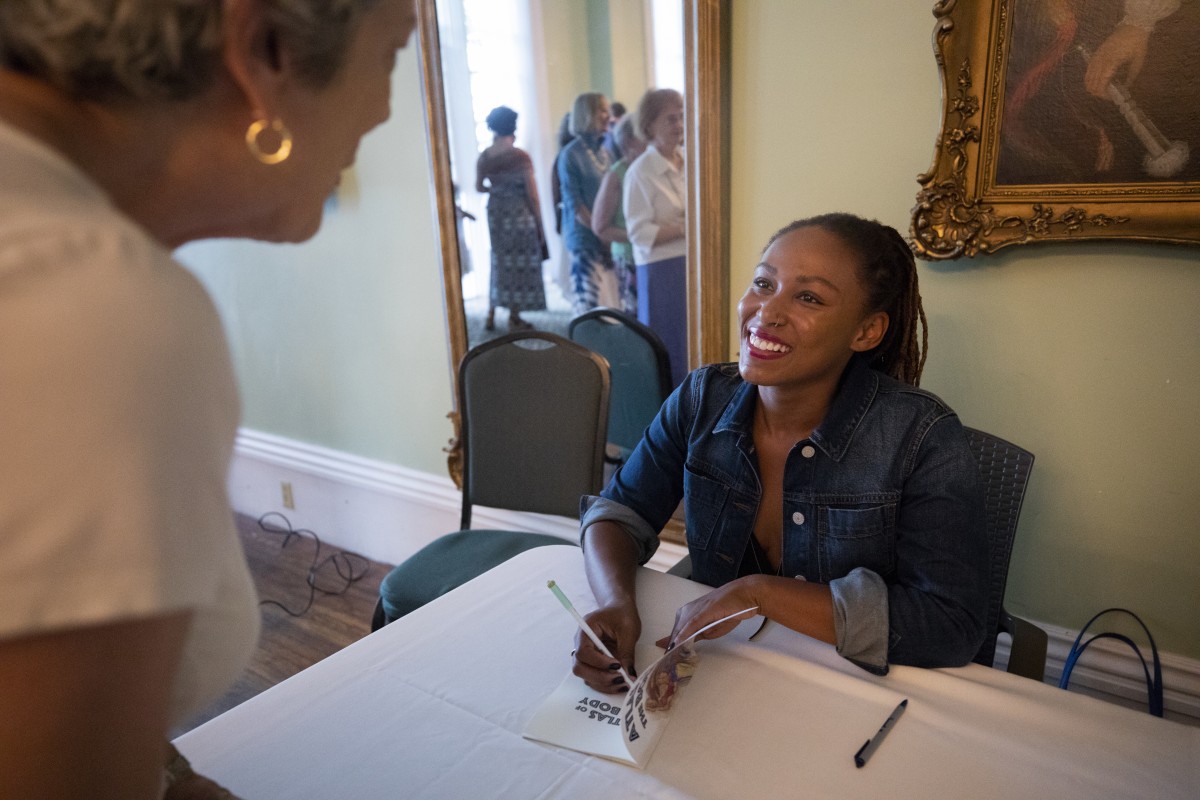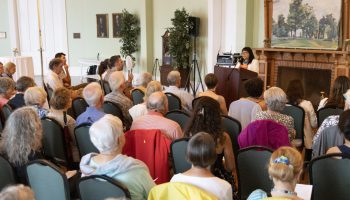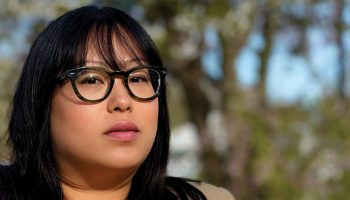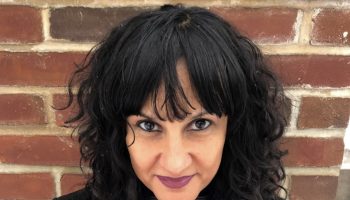
Chautauqua Janus Prize on Wednesday in the Athenaeum Hotel Parlor.
A reception for a prize honoring the disruption of convention received a similarly spirited celebration: jazzy and jubilant.
The inaugural Janus Prize reception was held at 7:30 p.m. on Wednesday, July 25, in the Athenaeum Hotel Parlor.
The evening celebrated the Janus Prize-winning work, Atlas of the Body by Nicole Cuffy, complete with jazz by the George Burton Trio and signature cocktails.
President Michael E. Hill commenced the evening by discussing Cuffy’s “incredible artistry.”
Hill said this season’s programming feels “fresh and contemporary,” in part thanks to the creation of a new position, director of literary arts, held by Atom Atkinson. He said the exciting energy of this season enthuses the longstanding tradition of the written word at Chautauqua.
Atkinson then took to the stage to explain the inspiration and namesake for the prize: Janus, the Roman god of duality, who looks simultaneously to the past and to the future. Atlas of the Body, they said, is fitting for the inaugural Janus Prize as it engages in literary and scientific thought, pillars of the Chautauqua Literary and Scientific Circle. And the short work manages to perform “leaps” and bounds, much like a spiritual journey.
Atkinson introduced the penultimate speaker, Kazim Ali, who chose Atlas of the Body as the winner from the selection of finalists.
Ali said this “amazing” short work is both timely and crucial. He said Cuffy questions how stories get told and who has access to voice, both newly relevant questions in an age when, finally, people are not written for, but writing themselves.
The story, Ali said, wrestles with simultaneity in an “age of information.” Ali also talked about the “taxonomy of access” and the costs of writing. Even a digital book, perhaps produced on a laptop, requires resources from the Earth, such as water.
Time and space, Ali said, are relative, a point rendered in Atlas of the Body with its montage-like storytelling of 17 years in one woman’s life. In this way, the story breaks from conventional “Aristotelian” arcs, Ali said. The narrative is one of a “lived life” that “ravaged and ravished” him.
Finally, Cuffy took to the lectern to discuss her bildungsroman, which she said blossomed from the idea of writing one emotion: loss.
She talked about the “inadequacy of language” using a white elephant as an example: when the audience was told not to picture a white elephant, that was the only image their minds could render. Similarly, the words “white elephant” never equal the picture the words connote.
“Prose doesn’t always have to tell you what it’s doing.”
–Nicole Cuffy, Author, Atlas of the Body
She often finds herself asking the question, “Why bother?”
“(Writing) is really hard,” she said. “It’s the reach that’s beautiful.”
A ballet enthusiast, Cuffy compared the “reach” to dancers on stage: they aim for perfection every time they perform, even knowing it is impossible. Their drive for perfection, she said, is beautiful. Similarly, writing is the inevitable attempt at understanding the human condition or, as Cuffy said, searching for a way “in” to a new description or rendering of the human experience.
“Putting words on a page shows you’re trying,”she said.
As is the purpose of the Janus Prize, Atlas of the Body disrupts convention, finding beauty in the mechanisms of language “diverging” from the status quo, Cuffy said. Cuffy compared her own writing process to the stages of grief, complete with denial, acceptance and the oscillation between thinking her work is “trash” and “brilliant.”
During the Q-and-A, one attendee, an artist, asked Cuffy why she creates. She wondered what Cuffy thinks is the purpose of art.
Cuffy answered that art helps people understand the human condition: Art, from an Impressionist painting to Atlas of the Body, acts as a “mirror” that reveals and reflects — like the duality of Janus — both representing and questioning life.




